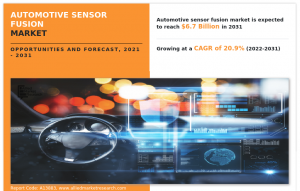Stringent government standards for safety features, technical advantages provided by sensor fusion
WILMINGTON, NEW CASTLE, DE, UNITED STATES, November 14, 2024 /EINPresswire.com/ -- The 𝐀𝐮𝐭𝐨𝐦𝐨𝐭𝐢𝐯𝐞 𝐒𝐞𝐧𝐬𝐨𝐫 𝐅𝐮𝐬𝐢𝐨𝐧 𝐌𝐚𝐫𝐤𝐞𝐭 report provides an extensive analysis of changing market dynamics, major segments, value chain, competitive scenario, and regional landscape. This research offers a valuable guidance to leading players, investors, shareholders, and startups in devising strategies for the sustainable growth and gaining competitive edge in the market. The global automotive sensor fusion market size was valued at $1.1 billion in 2021, and is projected to reach $6.7 billion by 2031, growing at a CAGR of 20.9% from 2022 to 2031.𝐃𝐨𝐰𝐧𝐥𝐨𝐚𝐝 𝐒𝐚𝐦𝐩𝐥𝐞 𝐑𝐞𝐩𝐨𝐫𝐭 (𝐆𝐞𝐭 𝐅𝐮𝐥𝐥 𝐈𝐧𝐬𝐢𝐠𝐡𝐭𝐬 𝐢𝐧 𝐏𝐃𝐅 - 236 𝐏𝐚𝐠𝐞𝐬) 𝐚𝐭: https://www.alliedmarketresearch.com/request-sample/A13883
The research provides detailed segmentation of the global automotive sensor fusion market based on technology, vehicle type, propulsion type, and region. The report discusses segments and their sub-segments in detail with the help of tables and figures. Market players and investors can strategize according to the highest revenue-generating and fastest-growing segments mentioned in the report.
The strong automotive sector in the North America region supports the demand for sensor fusion technology in vehicles. Numerous automotive companies in the region invest in the use of artificial intelligence in their sensor fusion products to help increase the safety and performance of vehicles, which is expected to drive the growth of the market. Autonomous vehicles reduce the number of accidents on the road and reduce the chances of accidents. Therefore, there is an increase in demand for autonomous vehicles owing to the luxury, quality, safety, and convenience of self-driving cars. Moreover, technological improvements such as adaptive algorithms, sensor processing, high-definition mapping, and infrastructure improvements are leading various companies to ramp up the production of self-driving cars.
𝐁𝐮𝐲 𝐍𝐨𝐰 & 𝐆𝐞𝐭 𝐄𝐱𝐜𝐥𝐮𝐬𝐢𝐯𝐞 𝐃𝐢𝐬𝐜𝐨𝐮𝐧𝐭 𝐨𝐧 𝐭𝐡𝐢𝐬 𝐑𝐞𝐩𝐨𝐫𝐭 : https://www.alliedmarketresearch.com/automotive-sensor-fusion-market/purchase-options
Based on vehicle type, the Passenger Car segment accounted for the highest share in 2021, contributing to more than three-fourths of the global automotive sensor fusion market, and is expected to maintain its lead in terms of revenue during the forecast period. The same segment is expected to manifest the highest CAGR of 21.5% from 2022 to 2031.
Significant factors that impact growth of the automotive sensor fusion market comprise stringent government standards for safety features, technical advantages provided by sensor fusion, and surge in demand for ADAS System. However, factors such as lack of sensor standardization and malfunctioning of vehicle electronic sensor system are expected to hamper the market growth. Furthermore, significant advancement of sensor and communication technology in vehicles, and development of autonomous vehicles are expected to create new growth opportunities for the automotive sensor fusion market during the forecast period.
𝐓𝐡𝐞 𝐤𝐞𝐲 𝐩𝐥𝐚𝐲𝐞𝐫𝐬 𝐩𝐫𝐨𝐟𝐢𝐥𝐞𝐝 𝐢𝐧 𝐭𝐡𝐢𝐬 𝐫𝐞𝐩𝐨𝐫𝐭 𝐢𝐧𝐜𝐥𝐮𝐝𝐞
Key players operating in the global automotive sensor fusion market include Aptiv, Elmos Semiconductor SE, Infineon Technologies AG, Mobileye, NVIDIA Corporation, NXP Semiconductors, Robert Bosch GmbH, STMicroelectronics, TDK Corporation, TE Connectivity, Texas Instruments, and ZF Friedrichshafen AG.
𝐆𝐞𝐭 𝐂𝐮𝐬𝐭𝐨𝐦𝐢𝐳𝐞𝐝 𝐑𝐞𝐩𝐨𝐫𝐭𝐬 𝐰𝐢𝐭𝐡 𝐲𝐨𝐮’𝐫𝐞 𝐑𝐞𝐪𝐮𝐢𝐫𝐞𝐦𝐞𝐧𝐭𝐬: https://www.alliedmarketresearch.com/request-for-customization/A13883
Based on propulsion type, the ICE segment accounted for the highest share in 2021, holding four-fifths of the global automotive sensor fusion market, and is expected to continue its leadership status during the forecast period. However, the BEV segment is estimated to grow at the highest CAGR of 24.5% during the forecast period.
Furthermore, the integration of sensor fusion technology in off-road construction and mining mobile vehicles to increase safety is expected to propel the growth of the market. For instance, in October 2022, Brigade Electronics, a UK based manufacturer of vehicle safety & security systems launched its latest security solution, Brigade Fusion, at Bauma 2022 in Munich, Germany. Brigade Fusion uses sensor fusion technology to combine Brigade's various safety devices, including 360-degree cameras, radar obstacle detection and M2M RTLS technology, to predict collisions and provide appropriate and timely warnings to drivers.
𝐈𝐧𝐪𝐮𝐢𝐫𝐲 𝐁𝐞𝐟𝐨𝐫𝐞 𝐁𝐮𝐲𝐢𝐧𝐠: https://www.alliedmarketresearch.com/purchase-enquiry/A13883
On the basis of technology, the global automotive sensor fusion market size has been segmented into Radar Sensors, Image Sensors, IMU, and Others. The IMU segment is expected to experience significant growth during the forecast period. An inertial measurement unit (IMU) sensor is a device that directly measures the vehicle's three linear acceleration components and three angular velocity components (six degrees of freedom). IMUs are unique among sensors commonly found in autonomous vehicles (Avs). The inertial measurement unit (IMU) is an important dynamic sensor for dynamically steering the vehicle and maintaining accuracy better than 30 cm for short periods of time when other sensors turn offline.
𝐎𝐭𝐡𝐞𝐫 𝐓𝐫𝐞𝐧𝐝𝐢𝐧𝐠 𝐑𝐞𝐩𝐨𝐫𝐭𝐬:
Automotive Intelligence Park Assist System Market - https://www.alliedmarketresearch.com/automotive-intelligence-park-assist-system-market-A13654
Hydrogen Powered Engine Market - https://www.alliedmarketresearch.com/hydrogen-powered-engine-market-A07807
Automotive Ecalls Market - https://www.alliedmarketresearch.com/automotive-ecall-market-A07113
David Correa
Allied Market Research
+1 800-792-5285
email us here
Visit us on social media:
Facebook
X
Legal Disclaimer:
EIN Presswire provides this news content "as is" without warranty of any kind. We do not accept any responsibility or liability for the accuracy, content, images, videos, licenses, completeness, legality, or reliability of the information contained in this article. If you have any complaints or copyright issues related to this article, kindly contact the author above.




